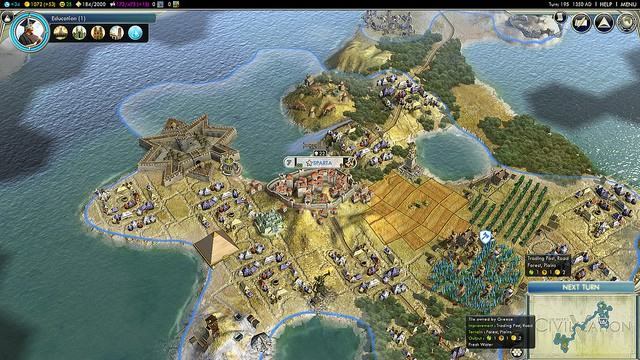During my freshman year in high school, I picked up a new game for my new computer system — Sid Meier’s Civilization II. This was a mistake. Just after lunch, I installed the game and started playing. The next time I looked away from the screen, it was pitch black outside and everyone else in the house was fast asleep. Engrossed in helping my virtual Romans conquer their randomly generated world, I had lost an entire day.
This memory came back to me recently when reading the fascinating article “Religion: The Game” at The Immanent Frame. Author Jason Anthony explores the prevalence of interactivity — “mediatization” in the academic language of the day — and how it impacts our spiritual and religious lives. We live now in an age where narratives are not simply stories where one person tells and another listens, but interactive experiences. The expectation is that the reader is no longer absorbing and engaging with a set text, but is helping to build out that text, to flesh it out and to participate in making it real.
Our twenty-first-century stories have evolved—or returned—to a more participatory format, a phenomenon which in the academy is coming under the critical rubric of cross-media or trans-media. Such stories are no longer discreet [sic] entities that exist between two covers but cultural experiences, a wide space to explore. Play Downtown [sic] Abbey: the Game. Watch Battleship: the Movie. Jump on the Transformers roller-coaster ride. The “real” form of a story dwindles in importance. On opening night of the 50 Shades of Grey movie, it’s barely a footnote that the story began as fan-fiction on a Twilight message board.
Religious traditions allow us to engage the world so that it might make sense to us. In this sense, they are “interactive.” Scripture, liturgy, and spirituality all draw us into a dialogue, an interaction, with our world, with each other, and with God.
Games themselves understand this. Religious idioms and tropes are staples of games, particularly those that aspire to deep and powerful “world building.” The Civilization series has often included various ways to represent religion in its simulated worlds. My most recent video game obsession, Dragon Age: Inquisition, is imbued with religious themes. Indeed, the underlying story of the series is one of religious experiences — good and bad — and the nature of how various individuals and societies deal with divine and mystical realities.
So, what does this offer to those of us with actual — not just digital — religious and spiritual orientations? It reminds us that our experiences of God are not just intellectual endeavors. Scripture comes alive through exercises such as Ignatian Contemplation or Lectio Divina. Imagination and creativity allow us to be present with Jesus on the beach, with the Apostles on the road, or with God in silence. Collectively, our liturgies are conversations between God, community, and individuals. Church teaching calls for “full, active, and conscious participation” — not just mere observation. Pope Emeritus Benedict XVI even referred to liturgy as a form of play, a rehearsal of life with God which takes us out of the routine and ordinary. Our goal with each of these exercises is a deeper experience, to hear and encounter God alive in our own lives.
Thus, the lessons of interactivity aid us in deepening our relationship with God and with each other. “World Building” is not just something for games; it speaks to a deep yearning within all of us.



